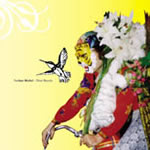|
|
 |
Dusted Reviews
Artist: Nathan Michel Album: Dear Bicycle Label: Tigerbeat6 Review date: Dec. 14, 2003 |

|
|
|
 |
The Tigerbeat6 artist roster is rife with oddballs, but Nathan Michel is perhaps the oddest of them all. He’s far removed from the cyber-punk image of many of his labelmates, a pure music nerd who is currently working to earn his PhD in composition from Princeton University and simultaneously reveling in the joyous discovery of the power of the computer as both compositional tool and instrument unto itself. Michel manages to heavily subvert the pull of academia with a peculiar, ever-present lightheartedness and an extremely quirky avant-garde pop sensibility. His particular brand of electronic music sports a great awareness of the work of his predecessors and contemporaries as well as drawing on many non-electronic influences, while also flaunting a refined harmonic sensibility that is far more advanced than many other pop compu-composers.
Dear Bicycle is Michel’s second album. The music of his debut, ABC DEF, suggested what DAT Politics might sound like if they worked up their chops as players and threw a little guitar into the mix. Dear Bicycle contains a number of excellent instrumental numbers reminiscent of ABC DEF, but for much of the album Michel has focused on crafting quirky, abstract pop songs, often replete with strange, yet mild-mannered vocals. The songs retain his glitchy, synth-heavy sonic palette and off-kilter phrasing, but are more tightly structured and rhythmically contained than the instrumental tracks.
Michel’s classically informed formal education is readily apparent in the pop tune context (to call them ‘pop’ is really a stretch), but he still manages to smother the academic in a goofy and nonsensical sense of humor that is so innocent and unthreatening you can’t help but suspect some mischief lurking somewhere out of sight. On “Theme Song” he cheekily quotes “The Entertainer” on a goopy synthesizer. “Star Spangled” uses samples of the harpsichord from a recording of Bach’s Goldberg Variations to construct a hokey, ham-fisted chord progression (a fun feature is the album’s detailed liner notes which reveal instruments and samples used on each track). “Glide” takes a page straight out of the Frank Zappa songbook, somewhere between Hot Rats and Overnite Sensation, with a vocal line that verges on virtuosic – and in place of Zappa’s gruff baritone is Michel’s soft, uninflected high tenor. The song stays here for exactly one verse, before suddenly mutating into a keyboard vamp that sounds like classic Bruce Hornsby.
Michel’s vocals are not his greatest strength – no matter what is being sung, his voice retains the same flat, somewhat shy and silly quality. His vocal melodies often times sound too contrived, too well-thought-out, and his mode of singing is too tongue-in-cheek to make any lasting emotional impact. The particular resonance of Michel’s voice, which is furthermore mixed quietly, renders a good deal of the lyrics unintelligible – perhaps this is intentional, but it grows frustrating. Some of the vocals do make for nerdy-fun listening – “Tell” sports seriously tricky rhythmic figures and time-signature shifts, while “I Delight in What is Right” is a catchy tune with a neat title that sounds like a sullen chemistry class suddenly burst into song, with a choreographed laboratory dance routine to match (here’s HCl in your eye, Britney!)
The music accompanying the vocals is always excellent, which unfortunately serves to underscore the relative shortcomings of the vocals themselves. The opening “Theme Song” sounds like, well, the theme song to a ’70 s cartoon about a distracted chemistry nerd who lampoons as a superhero. Without Michel’s vocals in the mix, the novelty is transformed into a sublimely manic good time, with every note and beat squirming to jump out of its seat and run pell-mell across the track. “2000” is a truly beautiful composition – a gently pulsing low-end ambience underlying the sound of water dripping delicately onto pebbles closely mic-ed, and in the foreground a touching mutron-and-reverb-drenched guitar line which is carefully taken apart and put back together again over the duration of the track.
If you count yourself a Frank Zappa fan, there is probably a special place in your heart for the music of Nathan Michel. But like Zappa’s music, and particularly his vocals, novelty can only carry even the most complex song so far. Fortunately, as with Zappa, novelty is only one aspect of Michel’s music, and arguably a less significant aspect than it was for his predecessor. There are elements of new music and fusion-era jazz tucked away Dear Bicycle. And for the adventurous follower of popular electronic music, there is ample material here to provide a welcome reprieve from the über-repetitive IDM situation.
By Jesse Serrins
|







